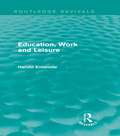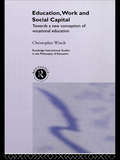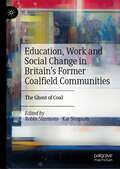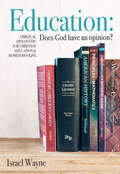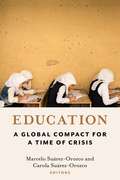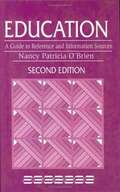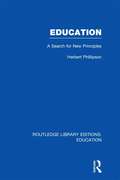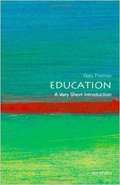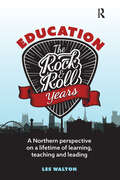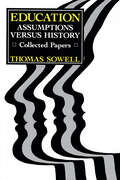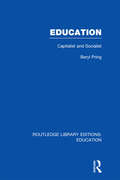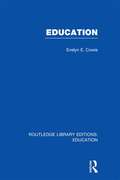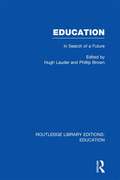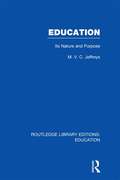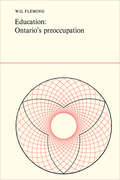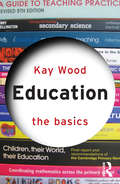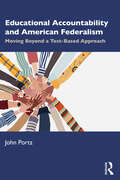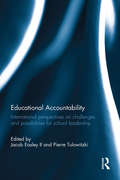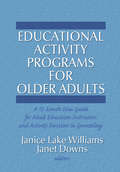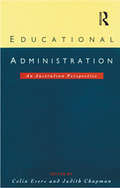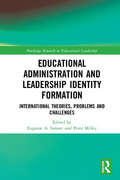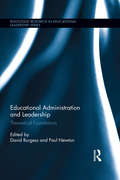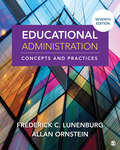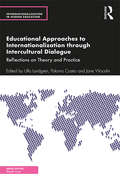- Table View
- List View
Education, Work and Leisure (Routledge Revivals)
by Harold EntwistleFirst published in 1970, this book considers the alleged distinction between ‘education for life’ and ‘education for work’ and exposes the fallacies on which this and other similar distinctions are based. It shows that ideas on this subject are inextricably intertwined with wider views on the nature of culture, the limits of individual educability and the provision of educational opportunities. Indeed, Dr Entwistle argues that students need to be well informed of these issues in order to be in a strong enough position to face problems of education and social development that will occur during their working lives.
Education, Work and Social Capital: Towards a New Conception of Vocational Training (Routledge International Studies In The Philosophy Of Education #Vol. 11)
by Christopher WinchThis book provides an integrated treatment of the relationship between political economy and vocational education at the beginning of the twenty-first century. Approaching the subject from a philosophical perspective the author engages with debates about* the work-related aims of education * the moral and spiritual significance of work * the concep
Education, Work and Social Change in Britain’s Former Coalfield Communities: The Ghost of Coal
by Robin Simmons Kat SimpsonThis edited book presents a range of chapters written by new and established authors, drawing on a range of different perspectives and traditions to critically analyse education, work and social change in the former coalfields. Historically, coal was one of Britain’s major industries, employing over a million men at its peak. But mining was more than an occupation - it was a way of life for those living and working in coalfield communities. Work, leisure, family relations and other dimensions of social life were centred upon the coal industry and its related institutions such as trade unions, working-men’s clubs and welfare institutes. These communities have, however, undergone significant social and economic change over time, not least in terms of the pain and suffering associated with the Great Strike of 1984–85, the successive waves of pit closures which took place thereafter and the eventual demise of the coal industry. The book will be of interest to academics drawing on sociology, social policy, history, geography and other subject disciplines.
Education: A Biblical Apologetic for Christian Education & Homeschooling
by Israel WayneStudents in America will spend over 14,000 seat hours in a classroom before they graduate from high school. On the other hand, most Christian children spend less than an hour a day in meaningful interaction with their parents, and only a few hours a week (at most) in church. Is it reasonable for us to assume that the Christian instruction they receive during off-hours will outweigh the thousands of hours of anti-Christian perspectives they are bombarded with by the media and the public school system? What does God say about how He expects Christians to educate their children? This book will radically challenge your paradigms and biases, but will consistently point you to the Word of God as the final answer for all of life, including education. Great resource for pastors, parents, and grandparents to understand the role of education in a Christian family. Aligns with the core philosophy of Master Books Curriculum and can be used as an apologetic for Christian education.
Education: A Global Compact for a Time of Crisis
by Suárez-Orozco, Marcelo; Suárez-Orozco, CarolaIn an age of catastrophes—unchecked climate change, extreme poverty, forced migrations, war, and terror, all compounded by the COVID-19 pandemic—how can schooling be reengineered and education reimagined? This book calls for a new global approach to education that responds to these overlapping crises in order to enrich and enhance the lives of children everywhere.Marcelo Suárez-Orozco and Carola Suárez-Orozco convene scholars and practitioners from a range of disciplines—including anthropology, neuroscience, demography, psychology, child development, sociology, and economics—who offer incisive essays on the global state of education. Contributors consider how educational policy and practice can foster social inclusion and improve outcomes for all children. They emphasize the centrality of education to social and environmental justice, as well as the philosophical foundations of education and its centrality to human flourishing, personal dignity, and sustainable development. Chapters examine topics such as the neuroscience of education; the uses of technology to engage children who are not reached by traditional schooling; education for climate change; the education of immigrants, refugees, and the forcibly displaced; and how to address and mitigate the effects of inequality and xenophobia in the classroom. Global and interdisciplinary, Education speaks directly to urgent contemporary challenges.Contributors include Stefania Giannini, the director of education for UNESCO; development economist Jeffrey Sachs; cognitive psychologist Howard Gardner; Carla Rinaldi, president of the Reggio Children Foundation; and academics from leading global universities. The book features a foreword by Pope Francis.
Education: A Guide to Reference and Information Sources (2nd edition)
by Nancy Patricia O'BrienFocusing on English-language publications of the last decade, this guide identifies and describes key reference and information sources in the field of education today.
Education: A Search For New Principles (Routledge Library Editions: Education)
by Herbert PhillipsonContributing to early debates on nature versus nurture, schools and the social environment, town planning and a free comprehensive education, the author discusses key educational issues against the background of a distintegrating Europe in the midst of war.
Education: A Very Short Introduction
by Gary ThomasFrom the schools of ancient times to the present day, Gary Thomas looks at how and why education evolved as it has. By exploring some of the big questions, he examines the ways in which schools work, considers the differences around the world, and concludes by considering the future of education worldwide.
Education: A northern perspective on a lifetime of learning, teaching and leading
by Les WaltonLes has often described himself as the ‘Forrest Gump of education’, as he seems to have been present at all the major educational developments since World War 2. This book is a very personal retrospective on a life in education over the last three-quarters of a century.He avoids personal negativity, though much of the narrative comes from a negative view of school and its impact on the lives of children. It is also a book full of hope that the human potential at the top of Maslow’s hierarchy, self-actualisation, can realistically be achieved. An optimistic, humorous, self-mocking account, it emphasises the seriousness of the issues covered - corporal punishment, industrial disputes, the impact of bereavement on children and many more - by sleight of hand. Important educational debates are cunningly illuminated through the reflections of a simple Geordie lad. There are key messages here for all those engaged in the process of life-long learning.Education: the Rock and Roll Years' is visionary, practical, rebellious, idiosyncratic and beautifully idiomatic. Its strength is combining personal experience with key principles. This is an excellent piece of writing.Professor Andy Hargreaves, Boston College and University of OttawaLes Walton has achieved great things at the most senior levels of education. The thing that marks him out is that no matter how senior his post, he has never forgotten that the purpose of education is to give opportunities, excite minds and change things. His reflections, which show how education and learning have done all these things in his life, make good reading and remind everyone why education is one of the most important things if a society is to thrive. Former Secretary of State for Education, Baroness Morris of Yardley
Education: Assumptions versus History: Collected Papers
by Thomas SowellIn the papers collected in Education: Assumptions versus History, Dr. Thomas Sowell takes a hard look at the state of education in our schools and universities. His imperative is to test the assumptions underlying contemporary educational policies and innovations against the historical and contemporary evidence.
Education: Capitalist and Socialist (Routledge Library Editions: Education)
by Beryl PringThis book argues that politics, in the sense of the government of our social structure, holds the key to the resolution of educational problems in the early twentieth century; that the teacher will only be relieved of his or her sense of frustration through government and ultimately socialist action. The author looks at the inequality of British education in the early twentieth century and the failure of capitalist education. She suggests measures to change the situation and discusses the aims and methods of socialist education.
Education: Examining the Evidence (Routledge Library Editions: Education)
by Evelyn E CowieThis volume contains both text and contemporary document which together look at the history of education from the French Revolution to the late twentieth century. The connection between text and documents is closely preserved so that the volume both explains and illustrates the important issues and problems and at the same time poses questions for students to consider or follow up.
Education: In Search of A Future (Routledge Library Editions: Education)
by Phillip Brown Hugh LauderWhat unites the contributors to this book is an opposition to Thatcherite policies on education and an agreement upon the need for the development of democracy in education. This volume highlights the importance of an area of neglected theoretical and practical concern: the development of a critique of the philosophy and policies of the new Right, and of credible alternative policies.
Education: Its Nature and Purpose (Routledge Library Editions: Education)
by M VC JeffreysThis book discusses the very nature and purpose of education and provides a foundation upon which more specialized studies in the psychology, history and sociology of education can be based. The book therefore surveys the main problems of human life – the relation of the individual and society, freedom and authority, continuity and change (i.e.growth), and underlying them all, the paradox that aspiration and frustration are continually linked in human experience. The educational implications of these various problems are considered in such a way that the methods as well as the aims of education are discussed.
Education: Ontario's Preoccupation
by W. G. FlemingEducation: Ontario's Preoccupation, a companion to the author's seven-volume series, ONTARIO'S EDUCATIVE SOCIETY, reviews the main highlights of educational development in Ontario, concentrating on interpretation rather than statistics. Written for everyone seriously interested in education, whether specialist or general reader, this volume provides an analysis and overview of the key issues that have arisen in education in the last decade and evaluates the prospects for formal education in the future. Among the topics Professor Fleming discusses in detail in this volume are the role of formal education, the expansion of the educational system, the quest for organizational efficiency, the relationship between the province and the universities, educational agencies outside the formal system, research and development, the financing of education, and the questions of religion and language. Education: Ontario's Preoccupation is indispensable as an introduction to the series ONTARIO'S EDUCATIVE SOCIETY, and provides in one volume a compendium of facts and analysis of the main issues in the province's educational development.
Education: The Basics (The Basics)
by Kay Wood@text: Everyone knows that education is important, we are confronted daily by discussion of it in the media and by politicians, but how much do we really know about education? Education: The Basics is a lively and engaging introduction to education as an academic subject, taking into account both theory and practice. Covering the schooling system, the nature of knowledge and methods of teaching, this book analyses the viewpoints of both teachers and pupils. Key questions are answered, including: What is education and what is it for? Where does education take place? How do we learn? Who are the students? What is being taught in schools and universities and why? What is the state of education across the world? With further reading throughout, Education: The Basics is essential for all those embarking on undergraduate courses in Education and Education Studies, and for those with an involvement in teaching at all levels.
Educational Accountability and American Federalism: Moving Beyond a Test-Based Approach
by John PortzThis book offers important insights into the complex nature of educational accountability and its role in supporting school improvement. By developing two key concepts – educational accountability and American federalism – the book highlights various types of accountability that take place in different institutional settings. By moving beyond the long-standing, test-based, administrative approach to accountability, the author demonstrates how professional, market, and political accountability affect teaching, learning, and educational policymaking. The book examines four accountability types: administrative accountability, professional accountability, market accountability, and political accountability. The volume questions why these accountability types vary in their development and use across the country, and considers how American federalism – national, state, and local – provides different political arenas with variation in ideas, interests, and institutions that prompt different policymaking approaches. The book concludes with a two-tier proposal for internal accountability organized around teacher professionalism and external accountability combining elements of school choice and public deliberation. This volume will be important reading for scholars and researchers in Federalism, Education Policy, and Public Administration. It will also be beneficial reading for policymakers, think tanks, and community organizations.
Educational Accountability: International perspectives on challenges and possibilities for school leadership
by Jacob Easley II Pierre TulowitzkiEducational Accountability: International perspectives on challenges and possibilities for school leadership provides an opportunity to assess, reflect on, and discuss current issues surrounding accountability policies in education from around the globe and the implications they hold for school leadership. It addresses the global trend of accountability policies expanding in scope to include the education profession as well as the increasing incidence of international policy borrowing, brought on chiefly by globalisation. Specific case studies offer a contextual examination of the theory, policy and practice of accountability and an inspection of their influence on school leadership. Cases are intentionally juxtaposed to provide a broad perspective of regional and cultural similarities and departures, and are arranged to reflect the diasporic Chinese, Anglo, European, and Hispanic societies. Bringing together a number of highly regarded experts within the field, the book cultivates a global perspective on the challenges and possibilities for school leaders to foster school effectiveness and improvement. Educational Accountability should be key reading for researchers, policy makers, and current and future school leaders.
Educational Activity Programs for Older Adults: A 12-Month Idea Guide for Adult Education Instructors and Activity Directors in Gerontology
by Janice Williams Janet C DownsIf you have ever found yourself frustrated by the lack of printed materials for ideas to be used in conducting classes or activities with older adults, look no more! Educational Activity Programs for Older Adults is an innovative guide for planning programs that meet the social, recreational, rehabilitative, and educational needs of older adults.This valuable resource includes detailed instructions for two activity programs and a list of events for each month of the year. Particular emphasis is placed on holidays and the events surrounding them, with every possible detail provided--history and culture, program overview, preparation, arts and crafts activities, and music, food, and costume ideas. The resourceful and skilled authors have also included a list of topics for every day of the month, which the creative activity professional can use to plan additional activities or generate discussions.Use this practical volume to offer new, unique, and effective instructional programs for older adults. The variety of the activities illustrates the wide range of choices and the limitless creativity you can use in program planning. The focus is on the individual and what benefits him or her most. You will learn how to prepare for each project and how to teach it--with step-by-step descriptions. Educational Activity Programs for Older Adults is a comprehensive book that gives you a wealth of ideas for flexible and fun projects that will motivate and educate the older adults with whom you work.Highlights of this useful book . . . theories related to aging that provide general background knowledge two activity programs and list of events for each month of the year a list of monthly events that contains at least one topic for every day of the month educational, stimulating, and fun activities for program participants and their instructors complete details of activities that develop specific motor skills and cognitive functioning in older persons an overview of the background of each holiday, as well as a thorough explanation of how to implement the program flexible programs to meet the needs of older adults step-by-step instructions for planning and teaching each activity lists of convenient materials for each project ideas for arts and crafts activities, music, and food that are appropriate for each holiday celebration ideas for activities that encourage individual participation, enabling older adults to express their interests, talents, and areas of expertise
Educational Administration
by Colin W. EversBoth the theory and practice of educational administration have undergone major changes in recent years. There is now more theoretical diversity in the field than at any other time, with influences from traditional and post-positivist science, subjectivism, ethics, critical theory and cultural studies. Similarly, social, political and economic factors have brought about new approaches to practice. Schools administration in particular is increasingly being dominated by decentralization and pressures for accountability on curriculum and educational outcomes.Educational Administration is the first Australian text to offer a comprehensive survey of theory, context and practice. It includes chapters from leading Australian scholars such as Richard Bates, Hedley Beare, Brian Caldwell, Gabriele Lakomski and Fazal Rizvi.
Educational Administration and Leadership Identity Formation: International Theories, Problems and Challenges (Routledge Research in Educational Leadership)
by Eugenie A. SamierEducational Administration and Leadership Identity Formation explores approaches and issues that arise in leadership identity formation in a variety of educational contexts. Bringing together a range of national and international contributions, this volume provides a global perspective on this multi-dimensional topic. This book examines the theoretical foundations relevant to identity and identity formation, and their implications for researching and teaching in educational administration and leadership. It includes a range of sociological, psychological, political, cultural, and socio--linguistic approaches to examining leadership identity formation. It also addresses models, practices and experiences that vary according to identity politics, cultural difference, and historical and contemporary privilege in leadership identity formation. Working from theoretical and practice-base perspectives, this book will be of great interest for researchers, practitioners, policy-makers and academics, as well as students in teacher education programs and graduate courses in educational administration and leadership, organisational studies, and educational ethics for broad international use.
Educational Administration and Leadership: Theoretical Foundations (Routledge Research in Educational Leadership)
by David Burgess Paul NewtonThis volume provides diverse perspectives and paradigms in educational administration and leadership. Focusing on particular philosophical and theoretical schools of thought, it traces the contemporary history of debates in the field while also exploring emerging, non-traditional schools for insight and potential contributions to educational administration in multi-cultural contexts. It critically examines trends and issues in society and their impact on educational theory, and gives an overview of the scholarly study of organizations, administration, and leadership to develop introductory understandings of significant concepts and theories.
Educational Administration: Concepts and Practices
by Fred C. Lunenburg Allan OrnsteinNow with SAGE Publishing! The bestselling Educational Administration: Concepts and Practices has been considered the standard for all educational administration textbooks for three decades. A thorough and comprehensive revision, the Seventh Edition continues to balance theory and research with practical application for prospective and practicing school administrators. While maintaining the book’s hallmark features—a friendly and approachable writing style, cutting-edge content, and compelling pedagogy—authors Frederick C. Lunenburg and Allan Ornstein present research-based practices while discussing topical issues facing school administrators today. Included with this title: The password-protected Instructor Resource Site (formally known as SAGE Edge) offers access to all text-specific resources, including a test bank and editable, chapter-specific PowerPoint® slides.
Educational Administration: Concepts and Practices
by Fred C. Lunenburg Allan OrnsteinNow with SAGE Publishing! The bestselling Educational Administration: Concepts and Practices has been considered the standard for all educational administration textbooks for three decades. A thorough and comprehensive revision, the Seventh Edition continues to balance theory and research with practical application for prospective and practicing school administrators. While maintaining the book’s hallmark features—a friendly and approachable writing style, cutting-edge content, and compelling pedagogy—authors Frederick C. Lunenburg and Allan Ornstein present research-based practices while discussing topical issues facing school administrators today. Included with this title: The password-protected Instructor Resource Site (formally known as SAGE Edge) offers access to all text-specific resources, including a test bank and editable, chapter-specific PowerPoint® slides.
Educational Approaches to Internationalization through Intercultural Dialogue: Reflections on Theory and Practice (Internationalization in Higher Education Series)
by Jane Woodin Paloma Castro Ulla LundgrenGiving voice to researchers, policy-makers and practitioners through a range of international case studies, Educational Approaches to Internationalization through Intercultural Dialogue interrogates processes of internationalization strategy and practice, from an educational and intercultural dialogue perspective. Addressing this important, under-discussed area of internationalization – the role of intercultural dialogue – this book provides theoretical reflections and applicable, practical case studies that focus on: Support for integration programmes for international and home students Mobility programmes and initiatives which use an intercultural dialogue approach The place of local languages and cultures in foreign language policies The possibilities within a higher education context The multilingual perspective Student and staff perspectives Focusing on teaching and learning, and exploring the latest research within the context of internationalization, Educational Approaches to Internationalization through Intercultural Dialogue is a must-read for anyone interested in, or currently involved in designing and implementing internationalization strategies within a higher education institution.
